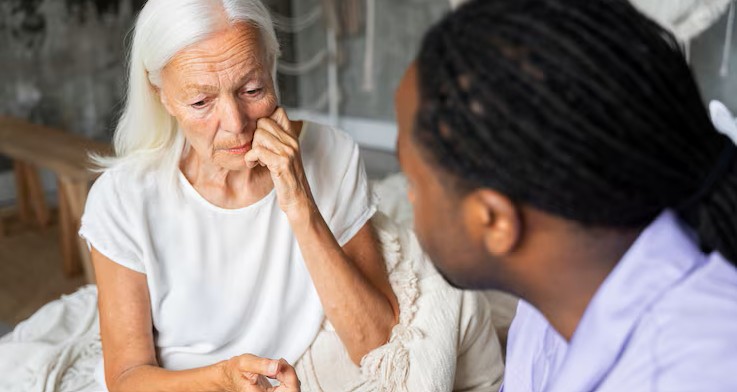How fear of weight gain can lead to life-threatening eating disorders

According to research done by the Yale School of Medicine and the University at Albany, a relatively low number of adults with an eating disorder diagnosis sought help for their symptoms or concerns.
Jasmine (not her real name) has an eating disorder, which she says gives her a strong fear of gaining weight.
"My doctor says I have a condition called anorexia. It makes me feel like I am fat even when I am dangerously thin,” Jasmine told The Eastleigh Voice.
It all started when she joined the university. She was a plus size, weighing 85 kilos which made some of her friends constantly body shame her and this affected her.
"My friends constantly bullied me by calling me names such as fat and ugly. They did not want to be seen walking with me. It had a mental effect on me and so I decided to start skipping meals as I tried excessive exercises but I wasn't losing weight as fast as I wanted," she said.
Jasmine's lifestyle of skipping meals became normal, and the fact that she started getting positive feedback on her weight motivated her. She would go for up to a week without food, surviving on water yet she wasn't on a holy fast but was looking for acceptance.
"I hardly felt hungry and rarely had cravings. I, however, remember finding myself on a hospital bed with my family surrounding me. That’s the day it hit me that I was so skinny and was down to 45kgs, that you would see my bones. My father told me that I needed help as the doctors said my BMI wasn't in line with my weight and height," said Jasmine.
She is currently on a nutrition programme that helps her improve her eating habits. At the same time, she is seeing a psychologist who is helping her accept who she is and not starve herself to death.
However, Jasmine says that each time she looks at a plate of food, she feels sick and is no longer hungry.
We also met John (not his real name), who, unlike Jasmine, has Bulimia, an eating disorder that makes him eat a lot of food and then self-induce vomiting or diarrhoea.
His life changed when he won a scholarship and travelled abroad for further studies.
"Being in a foreign land with no relatives for almost three years is not easy, so it all started as a hobby that I used to keep myself busy."
John would watch food channels and try new types of food. He slowly started gaining weight and when he would make video calls to his family, they, especially his mother, would say his weight was scary.
"I left Kenya weighing 65kgs, but after staying in Paris for a year, I was 97kgs. I loved food but such comments coming from my mum hurt me. I decided to google ways I would still eat and at the same time lose weight. I looked up weight loss surgeries, but they were way too expensive," said John.
He eventually found a solution to his feeding habits and the comments from his mother over his weight gain, and it became a lifestyle. But he has never looked for professional help, as he has not experienced life-threatening health conditions.
Riziki Ahmed, a psychologist, says bulimia and anorexia are common eating disorders caused by anxiety, dysfunctional families, and poor self-image. She adds that social media platforms can contribute to increased incidences, mostly among teenagers and young adults.
"Anorexia is a serious medical and mental health condition that can be life-threatening. This is because it's an eating disorder that is driven by the fear of weight gain, which makes people restrict their eating, leading to dangerous weight loss," said Riziki.
Riziki said symptoms of anorexia are related to depression, suicidal behaviour, poor appetite, preoccupation with food, and fear of weight gain.
"Anorexia and bulimia are treatable by restoring eating and weight, family support, and assistance with meals," says Riziki.
Nutritionist Lilian Nduta says she has handled patients with bulimia and anorexia. She says the conditions are not so common in Kenya. However, some people could be living with eating disorders but are not aware of it.
"We give psychosocial wellness and nutrition services to such patients. We also advise them not to starve themselves but to eat according to the capacity of their stomach," says Nduta.
According to Nduta, poor self-image issues mostly start in childhood and manifest in adolescence and adulthood, leading to eating disorders that can be associated with mental illness.
According to research done by the Yale School of Medicine and the University at Albany, a relatively low number of adults with an eating disorder diagnosis (anorexia nervosa, bulimia nervosa, or binge-eating disorder) sought help for their symptoms or concerns.
Overall, only about half of the people reported seeking any form of help. Differences were observed across the different eating disorders, with 34.5 per cent of adults diagnosed with anorexia seeking help, compared to 62.6 per cent of those with bulimia nervosa and 49 per cent with binge-eating disorder.
Overall, fewer than 30 per cent reported seeking help from a counsellor or psychologist and fewer than 20 per cent reported receiving medication for their symptoms.
The study also found that men and members of ethnic and racial minority groups were even less likely to seek help for their eating disorders.
“Eating disorders are commonly portrayed as a ‘female disorder,’ which might contribute to underuse or delays in help-seeking behaviour in men owing to their own or their providers’ under-recognition of eating disorder symptoms,” the research said.
Top Stories Today










































